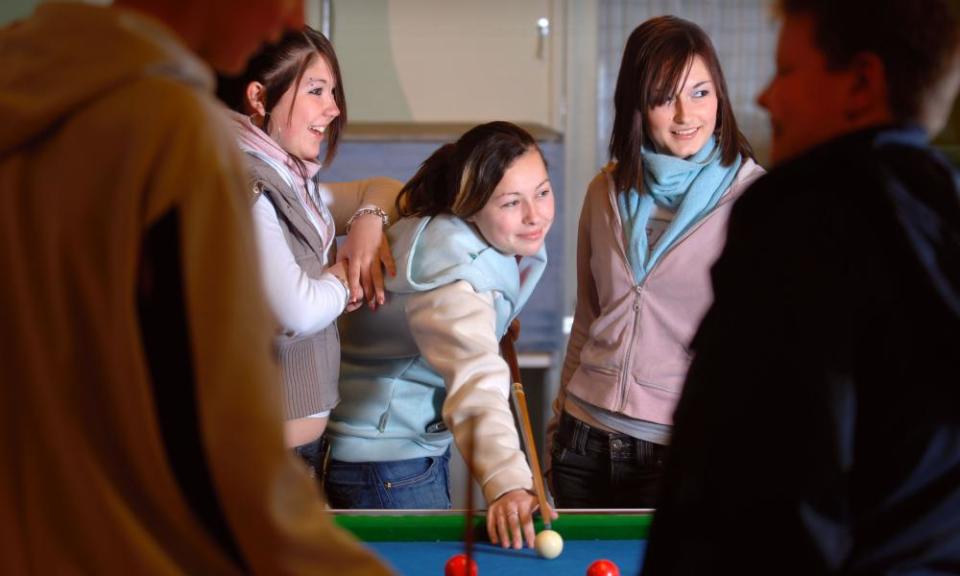Youth clubs can work miracles – could having more of them stop teens selling drugs?

I know this guy who doesn’t want to be a gangster any more. But leaving that world behind is a challenge for him, because if he runs short of money there’s always the temptation to go and make some very quickly. One evening he listed the many ways he could still pop out and easily make four figures worth of cash before midnight. I wondered if he was a bit of a fantasist. I’ve since found out that he definitely isn’t. Either way, those days are gone. Whenever I ask him how he’s doing, he gives me the same answer. “Trying to find a way,” he says, with a shrug. By which he means, trying to find a way of living without breaking the law. I wish him every success.
I once met him for a cup of tea after work. I had just been interviewing a woman who was lamenting the lack of funding for youth clubs. I was told what a short-sighted false economy losing youth clubs is; how these community organisations can keep youngsters out of trouble and reduce crime. I saw the logic of this, without really believing it would work quite like that. So, I asked my ex-criminal mate: “Youth clubs wouldn’t solve anything, would they?” “They would. They definitely would,” he replied. “They make a big difference; just giving kids something to do.” Coming from him, this was persuasive.
It has been reported this week that drug gangs have recruited more girls to sell their wares, as they attract less attention on the quieter streets of lockdown. I put this to Michelle Mitchell, who runs a community organisation called Play in Newcastle, which works to give teenagers the opportunity to do just that, play.
“The girls have been doing it for quite some time now,” she told me. “That’s not new to us. Boys and girls have both been busy with it during lockdown. They’ve taken advantage of the exercise allowance, walking dogs. They’ve been getting a lot of exercise,” she adds drily.
I came across Michelle in the course of helping set up a commission, with the ex-footballer Brendon Batson and broadcaster Charlie Webster, to look at the value of community groups like hers. Listening to Michelle for 10 minutes is enough to win anyone over. Her strategy is to give the kids things to do and important stuff to talk about. “We’ve got access to the River Tyne so I’m like: ‘Get your coats on, we’re going down there. We’re going to climb some trees; we’re going to build a den. We’re going to do things like you should be doing.’
Related: Number of London youth clubs nearly halved since 2011 riots, report finds
“The older ones like music, so we brought in a DJ and learned how to use the decks; how to do MCing properly. It’s what they want; it’s about listening to them. They’re always hungry so they always get a meal, which they cook. They love cooking, especially the boys, actually. I love to listen to them; it’s how you engage them. They love to be given their own voice and have time to be heard, about sex, drugs, whatever. You learn so much about what goes on.”
This is tough love though. “They sign a contract; a code of conduct. If they’ve been causing antisocial behaviour out on the street the police will inform us, and when they turn up at the youth club I’ll tell them: ‘You can’t come in tonight because last night you were giving that old lady grief outside the shop.’ And that kills them. They beg me, but I say no; that learns them a lesson.”
All of which raises an obvious question: if Michelle and her team, and others like them around the country weren’t there, what would the kids do?
“I don’t know where they’d be, and what they’d be up to,” she says. “That’s the scary thought; the really scary thought. It’s not even nice to think about.”
Not that I would dare to quibble with Michelle any more than my ex-gangster, but places like these are critically important. With the few thousand quid a year they scrape together to fund them, they’re working miracles.
It has been said that what we all need is someone to love, something to do and something to look forward to. Groups like Michelle’s provide two of those, at least, to those who need it most.
• Adrian Chiles is a Guardian columnist

